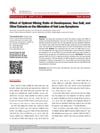The right balance of Myo-Inositol to D-Chiro-Inositol in follicular fluid is crucial for good egg and embryo quality.
 1 citations,
February 2022 in “Biological Trace Element Research”
1 citations,
February 2022 in “Biological Trace Element Research” The combination of Arginine Silicate Inositol Complex and a new form of Biotin improved hair and nail growth in rats.
[object Object]  44 citations,
February 2012 in “The journal of neuroscience/The Journal of neuroscience”
44 citations,
February 2012 in “The journal of neuroscience/The Journal of neuroscience” Mutations in the PTPRQ gene cause significant balance issues in mice due to hair bundle defects in the inner ear.
 36 citations,
May 2021 in “Nutrients”
36 citations,
May 2021 in “Nutrients” Natural molecules like inositols, resveratrol, vitamins, and omega-3 fatty acids may help manage Polycystic Ovary Syndrome (PCOS), but their effects vary and need more exploration.
9 citations,
October 1946 in “Experimental biology and medicine” Rats fed soybean oil meal lost hair, but adding inositol, biotin, cystine, or methionine to their diet prevented this and improved growth.
 1 citations,
April 2019 in “Endokrynologia Polska”
1 citations,
April 2019 in “Endokrynologia Polska” Healthy diet and exercise are important for women with PCOS to manage weight and metabolic issues, and supplements like omega-3, vitamin D, and inositol may help.
[object Object]  75 citations,
November 2009 in “Gynecological Endocrinology”
75 citations,
November 2009 in “Gynecological Endocrinology” Myo-inositol may be more effective than metformin for inducing ovulation in women with PCOS.
 3 citations,
March 2020 in “Dermatology Research and Practice”
3 citations,
March 2020 in “Dermatology Research and Practice” Tracnil™, a mix of myo-inositol, folic acid, and vitamin D3, safely reduced acne, improved excessive hair growth, and fixed irregular periods in overweight women with PCOS.
 72 citations,
July 2014 in “American journal of clinical dermatology”
72 citations,
July 2014 in “American journal of clinical dermatology” Some treatments, like corticosteroids and sensitizing agents, can help with alopecia areata, but more high-quality research is needed.
 54 citations,
August 2017 in “Gynecological Endocrinology”
54 citations,
August 2017 in “Gynecological Endocrinology” Lifestyle changes and weight loss are key for treating PCOS-related metabolic issues and infertility, with various medications available for specific symptoms.
 49 citations,
November 1992 in “Archives of dermatology”
49 citations,
November 1992 in “Archives of dermatology” Different treatments for alopecia areata have varying success rates and side effects; intralesional steroids are most effective.
 47 citations,
October 2014 in “Expert Opinion on Emerging Drugs”
47 citations,
October 2014 in “Expert Opinion on Emerging Drugs” New alopecia treatments aim for better results and fewer side effects.
44 citations,
September 2020 in “International Journal of Molecular Sciences” New treatments are needed for PCOS that target its genetic, hormonal, and metabolic causes.
 43 citations,
October 1955 in “The journal of nutrition/The Journal of nutrition”
43 citations,
October 1955 in “The journal of nutrition/The Journal of nutrition” Germ-free rats need biotin for growth and have different vitamin metabolism compared to regular rats.
 41 citations,
September 2018 in “Australasian journal of dermatology”
41 citations,
September 2018 in “Australasian journal of dermatology” No systemic treatment for alopecia areata has strong evidence of effectiveness.
11 citations,
October 1941 in “Experimental Biology and Medicine” PABA helps prevent gray hair and hair loss in mice.
6 citations,
November 2022 in “Antioxidants” OR2AT4 helps reduce aging and cell damage in human skin cells.
 6 citations,
October 2012 in “Journal of Heredity”
6 citations,
October 2012 in “Journal of Heredity” The Itpr3 gene causes a specific hair pattern in mice.
5 citations,
August 2021 in “Journal of drug delivery and therapeutics” The herbal shampoo with fermented rice water is safe and effective for reducing hair fall.
 5 citations,
December 1942 in “Journal of the American Medical Association”
5 citations,
December 1942 in “Journal of the American Medical Association” Choline and biotin are important for liver health and preventing certain deficiencies in animals, and more research is needed to understand their benefits in humans.
 2 citations,
December 2021 in “Asian Journal of Beauty and Cosmetology”
2 citations,
December 2021 in “Asian Journal of Beauty and Cosmetology” The optimal mix of Dendropanax, sea salt, and other extracts can help reduce hair loss.
 2 citations,
May 2023 in “Current Nutrition Reports”
2 citations,
May 2023 in “Current Nutrition Reports” Eating a Mediterranean diet and taking certain supplements may improve symptoms of PCOS.
 1 citations,
June 2019 in “Food Research”
1 citations,
June 2019 in “Food Research” Tempeh oil rich in linoleic acid may protect against skin aging caused by UV light.
 1 citations,
January 2019 in “Advances in Medical Sciences”
1 citations,
January 2019 in “Advances in Medical Sciences” The combination of azelaic acid, minoxidil, and caffeine significantly increased the survival of skin flaps by affecting certain body channels and nitric oxide levels.
 1 citations,
September 2010 in “The journal of investigative dermatology/Journal of investigative dermatology”
1 citations,
September 2010 in “The journal of investigative dermatology/Journal of investigative dermatology” The meeting highlighted major advances in skin research, including new findings on skin microbes, genetic links to skin diseases, and improved treatments for various conditions.
 1 citations,
November 2008
1 citations,
November 2008 Yonnyuniksoogobon-dan taken orally promotes hair growth by affecting growth factors in hair roots.
 1 citations,
July 2023 in “Frontiers in Immunology”
1 citations,
July 2023 in “Frontiers in Immunology” Oxidative stress and immune dysfunction are linked to both Hashimoto's thyroiditis and polycystic ovary syndrome, with diet and specific treatments important for managing these conditions.
 1 citations,
January 2022 in “Journal of experimental and clinical medicine”
1 citations,
January 2022 in “Journal of experimental and clinical medicine” PCOS is linked to diabetes and insulin resistance, and managing AGEs may help treat related symptoms.

The new hydrogel helps heal burn wounds better than current options by reducing bacteria and inflammation.






















